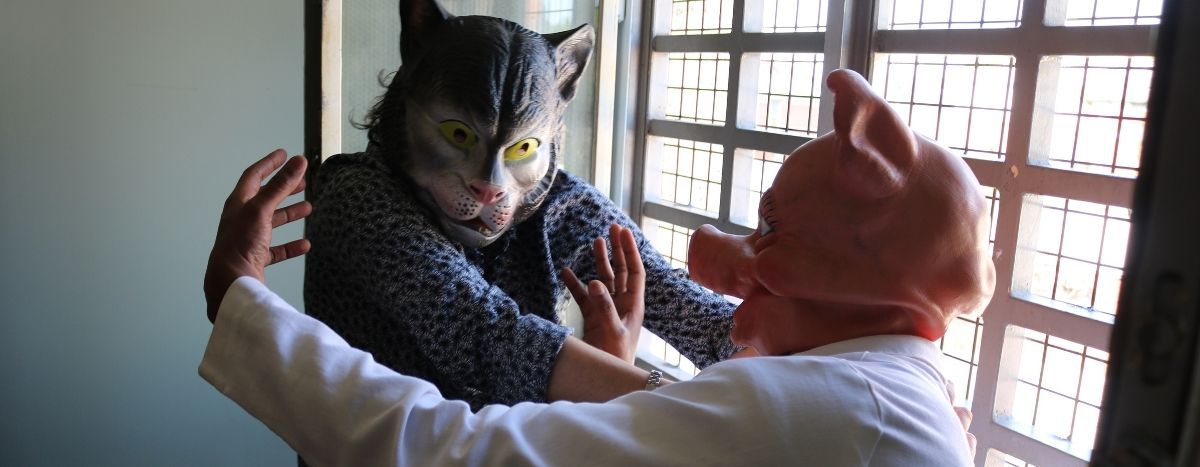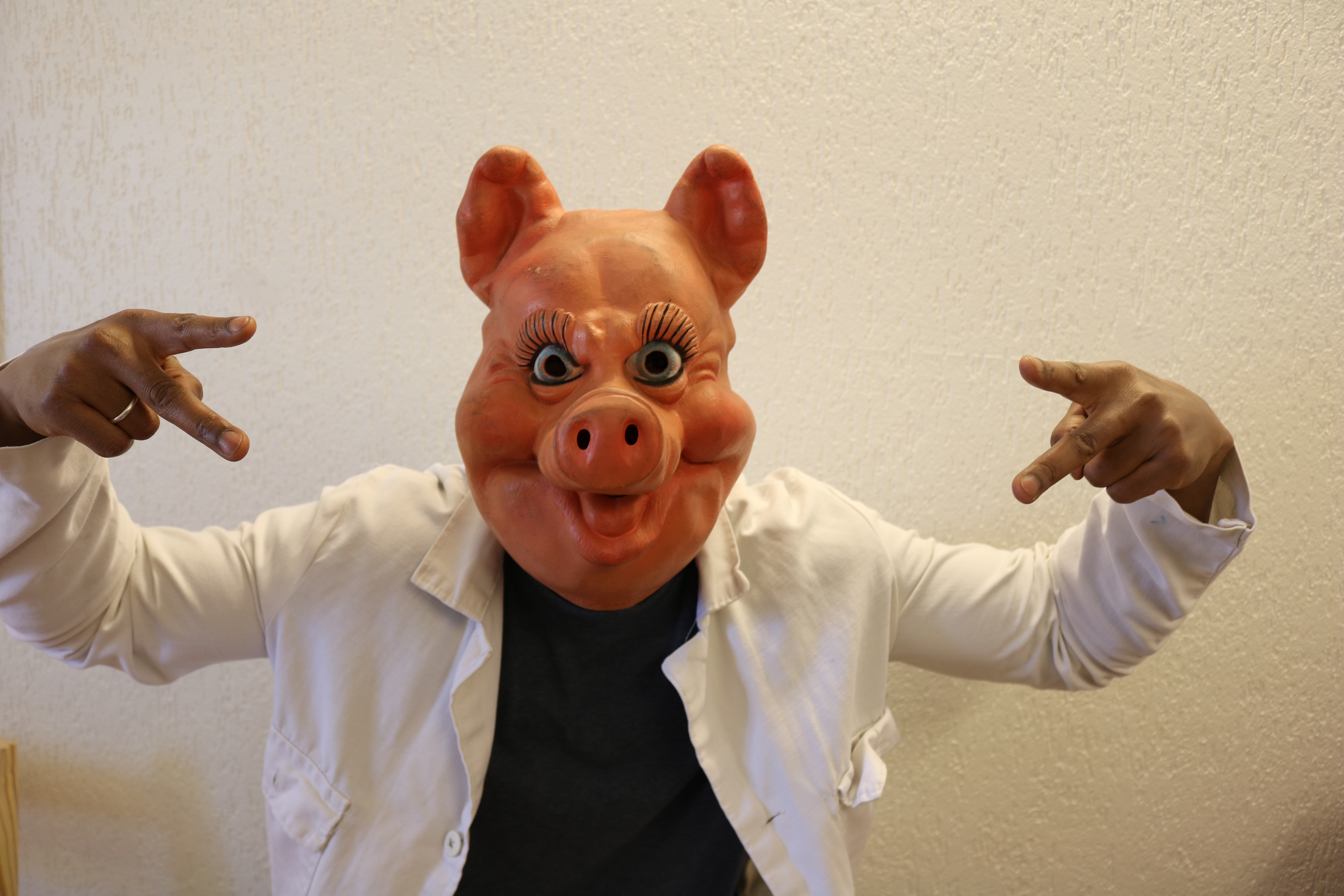
Escaping prison through theatre
Published on
Translation by:
Anam ZafarOnce a week, the inmates of Ittre Prison, Belgium, have the chance to escape and catch some fresh air—for the length of an act. We took a peek behind the curtains of the prison’s drama workshop.
“You might not have freedom, but you still exist.”
Pablo Balo spent several years in Ittre Prison Belgium, a ‘high security’ building. Now a free man, prison for him was about “becoming a better person”. So, when he got in, he decided to get involved in what the prison had to offer. “I wasn’t like the other prisoners. I went to lots of classes,” he explains on the telephone, fondly mentioning ‘Philosophy Café,’ yoga, art, church service and emotional therapy, to name a few.
But there was one class that Pablo found particularly inspiring during his incarceration. “I always looked forward to drama day, which was Wednesday,” he remembers. “I was happy! Honestly, never in my life have I been as happy as I was during drama class.”
A life in limbo
Most inmates at Ittre Prison are serving long sentences, very often longer than fifteen years. Day in, day out, they count down to their release date alongside their peers. They wear the same uniform, eat the same food and share the same ‘yard time’ (the hours when prisoners can go out onto the inner courtyard, note from the editor). According to Despina Psimarnou, a counsel at Forest Prison, near Brussels, “You notice some people losing their identity. Some make an effort to decorate their cell a bit, while others leave them completely empty.”
A smiling and lively persona, Despina, originally from Greece, has been leading theatre workshops in prison for 15 years, providing prisoners with a means of escape. “At Ittre Prison, I am constantly learning,” she explains. “The workshops are all about personal development. I focus a lot on emotions, because I’ve noticed that it’s something that prisoners have learn't to hide in their daily lives here. My workshops are dynamic. There’s a joyful atmosphere and lots of laughs, we leave the sphere of incarceration for a few hours.”
"Never in my life have I been as happy as I was during drama class."
In Belgium, the “sphere of incarceration” has become particularly tense, with recent media uproars surrounding prison overpopulation and squalidness. Last month, an RTBF report uncovered the conditions at Lantin prison, where overpopulation was reported to be at an unprecedented 142%. The Council of Europe states that each prisoner must have at least 4 metres square of personal space, which is far from the case in Belgium.
25-year-old, Antonio has spent part of his youth in Belgium’s prison system. When we met in a café in Mons, he confirmed the media reports. “At Forest, entire sections were shutdown because of the lack of cleanliness. There were rats. And there were far too many people,” he said.
Antonio, a calm young man, was transferred to Ittre in March 2016. He immediately joined Despina’s drama classes, seeing them as an opportunity to forget about prison for a while. “Drama does you good, especially because it gives you a change. You escape in a way, by playing different characters. For a while, you forget where you are.” Antonio followed the drama classes a few months before being released.
Letting go under control
The weekly drama class at Ittre begins with a long physical warm-up, based on rhythm, body movements and the voice. Participants are invited to let themselves go, even to shout. “I encourage them to give it their all, to exaggerate their emotions using their body,” explains Despina, who has trained herself in movement theatre. The warm-up exercises prove to be the most difficult part for many participants, including Pablo Balo. “At one point, you had to walk from one side of the room to the other, changing your walking style each time. That was the most difficult thing for me,” he explains over the phone. The rest of the three-hour workshop consists of a series of Improv sketches. The themes are varied, but generally don’t have anything to do with prison life.
Pablo Balo attended these classes for a year, from 2012 to 2013, after hearing about them through word of mouth. He still remembers the shyness that overwhelmed him during his first session.“There were 8 or 9 others there. When I came in, everyone stared at me because I was new,” he said. However, he insists that he is far from being a shy person and was determined to overcome his feelings during class. He said,“I noticed that Despina was barefoot, so in my second session I decided to do the same. I felt much better.”
“These workshops change your perception of others and of yourself, but they don’t change everything.”
To help participants “letting go”, Despina chooses animal themes. The last public performance by Ittre inmates, for example, was Monkey Memory, Human Words, a play by the neurologue and psychiatrist Boris Cyrulnik. The play features a fox terrier who is locked in an empty room, alone, for a long period of time, and explores the dog’s evolution in this setting. As the play progresses, being locked up starts to affect the animal’s behaviour. “At one point, the animal becomes suspicious of everything,” explains Despina. “It’s a way of examining adaptation behaviours in prison”, she said.
Performing in front of an audience is not easy. Since the drama group is always changing, with people constantly entering and leaving prison, it takes Despina around two years to put a piece together. During class, she keeps note of the ideas that surface in the Improv sessions, in order to create a play that really represents the group. “Our play was hilarious, so much happened in it, Pablo remembers warmly. It was based on lots of different stories that we had put together, about prison, traveling, even obscure ideas from games of consequence, such as ‘I see everything in blue’. We also used a text by Benoît Poelvoorde about a pigeon in a city.” Pablo still remembers some verses of the poem.
Pigeon, winged cloak of grey, In the city's hellish maw, One glance and you fly away, Your grace holds me in awe.
It Happened Near You: Rémy Belvaux, André Bonzel and Benoît Poelvoorde (1992)
United, but not friends
The staff at Ittre Prison encourage workshops like these to be held. “It shows that the prison is active, which is important on a political level,” says Despina. Despite this, she wishes that the staff would get more involved in organizing and hosting workshops and classes themselves. “The more involved the staff are, the better,” she asserts.
There is a real team spirit within the drama group, say its participants… but it stays strictly inside drama class. Once they return to their cells, prison code regains the upper hand. “We were united, but not friends. You can’t have friends in prison – it’s a rule,” says Pablo categorically. This code of conduct seems to be shared with many other prisoners. “These workshops change your perception of others and of yourself, but they don’t change everything. There is no friendship in prison,” claims Despina.

Free to find yourself
Despina’s longstanding experience in this field has allowed her to notice significant changes in the behaviour of certain participants, especially those who are more reserved. As she notes in a report: “They develop a voice, a presence. Over time, they begin to take initiative and to make suggestions.”
Choosing to attend these classes is a big step in itself. Antonio made the decision not to spend time in the yard, preferring to keep his time free for drama. This is a complicated choice to make in the eyes of some other prisoners. “They didn’t want to sign up because one of the participants was a prisoner who committed ‘immoral acts', he explains, troubled. They didn’t understand why I would go to classes with this person. People had a problem with it.” Today, Antonio confirms that the workshops helped him to develop both during and after prison. “They increased my self-confidence. Looking back, you realise how much it helped,”he said.
“The classes gave me a space to imagine”
For Pablo, who is a generation ahead of Antonio, theatre was a means of real liberation. “The classes gave me a space to imagine. I cranked up my creativity to 100%, he enthuses nostalgically. I used to be full of emotions and I didn’t know what to do with them. But in drama, I acted out everything that I had experienced in the past and, miraculously, I felt freed from those emotions.”
To this day, these two ex-prisoners have kept their ties with drama. Pablo is still in contact with Despina and has asked her to put him in touch with some drama classes. He has also found work through a friend. As for Antonio, he is currently in sales training and is a regular film extra. You can see him appear furtively next to Vincent Lagaf’ in Marguerite, the first film from Belgian director Mik Colignon.
Photos and cover photo: © Milena Bochet, during a screening of the collective film ‘What I miss when I no longer see far away’, created with Forest Prison in 2017
Translated from En Prison, le théâtre pour s’évader



